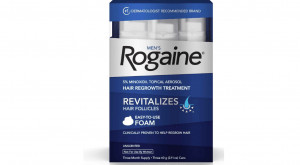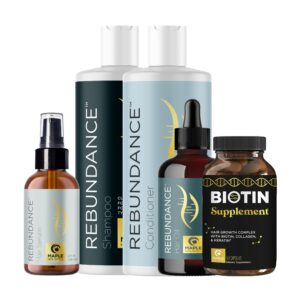What Is DHT? Can Your Hair Loss Be Reversed By DHT Blockers?

Balding can be an unpleasant thing to undergo. Feeling that your hair is thinning out more than usual, to the point of frustration, can be equally dispiriting. According to researchers, you’ve got DHT to blame for that – dihydrotestosterone. It’s a chemical which has positive and important attributes, but also some which are less welcome. This is what you should know about DHT.
Older and wiser people than myself have said that sometimes getting older is not fun. Your body starts to betray you, or at least act in unpredictable ways. Your whole life you get used to this body, this vessel, this wondrous machine. You grow a nice head of hair, but at some point your body just says: “Okay, chief, that’s it. You can take it from here”, whereupon male and female pattern hair loss takes place.
With males, this can start happening as early as a man’s late teens and twenties. Women are more likely to be affected by female pattern baldness later on in life. Alright, let’s get back to DHT.
What Is DHT? What Does DHT Do To Your Hair?

Both males and females have DHT in their bodies.
What is DHT exactly? It’s the abbreviated name of dihydrotestosterone. DHT is a sex hormone which both males and females possess. It’s made in our body from the well-known hormone testosterone. Testosterone is famously in charge of bringing about the various aspects of puberty in males: physical growth, body hair, deeper voice, and so on. Okay, but what does DHT do to the hair on your head?
Within the hair follicle (also known as the root), there is a continual cycle of growth. Hair sprouts, grows, and falls out – and then a new hair will often replace it. We all – men and women alike – lose anywhere between 50-100 hairs a day. Or in some periods of increased shedding, one can lose up to 300 hairs. That’s still normal, and the hair usually grows back. But there is an issue with DHT and hair, because some people’s follicles are more sensitive to DHT. This sensitivity may inhibit the follicles’ ability to carry on with their cycle.
DHT And Testosterone

Everyone’s hair is sensitive to different things.
There’s a misconception regarding testosterone and hair loss, so let’s attempt to break down the testosterone myth a little.
DHT is five times more potent than ordinary testosterone, and the body naturally converts 10% of all testosterone to DHT. Male and female pattern baldness – also known as androgenic alopecia – stem from DHT, not from testosterone itself. The DHT prevents the hair root from absorbing nutrients. Because of that, the follicle shrinks and leads to thinning. In some cases, it stops producing hair altogether.
In order for DHT to have that detrimental effect on hair, the follicles must be sensitive to its presence. Furthermore, they need to be sensitive to such a degree that it manages to disrupt their natural patterns. The follicles are in charge of supplying the hair shaft with nourishment and natural oil. If the shafts don’t have the nutrients they need, they become weak and prone to breakage.
Not everyone’s hair is the same, which is why some can harbor a larger amount of DHT in their system and not have it affect their hair. Different things affect the strength or weakness of hair follicles. But the most significant of them is the individual’s genetic makeup and family history.
Incidentally, some skeptics feel that relying on “oh, it’s your genes” as an answer is problematic. They often blame Big Medical and Big Pharma.
Ever since DHT was singled out as the main perpetrator of the Great Human Hair Heist, different DHT-blocking products have popped up. They claim to provide the user with a better chance of staving off thinning and baldness.
What Is A DHT Blocker?

Genes also play a big factor in a man’s hair fullness.
What is a DHT blocker? It’s the name given to a chemical or substance which manages to inhibit or limit the effects of DHT on the human body. Consequently, DHT blockers are seen as effective means of preventing hair loss from taking place. They’re also hailed as aids in the appearance of new growth (though the latter claim will only affect those who are in the very early stages of the condition).
Now, men who are genetically predisposed to male pattern baldness will usually go on to experience some hair loss anyway. This remains true even if there are no higher-than-average levels of DHT in their system. Those who have dominant hair loss genes (for lack of a better term) will be sensitive to normal amounts of DHT. In that regard, DHT-blocking products are never 100% effective. And I don’t think they claim to be, either.
So, high levels of DHT do not account for 100% of the pattern baldness issues. A person could have little amounts of DHT, and still his scalp could react as though there is an excessive amount of it. This has to do with one’s sensitivity to the hormone. Someone whose follicles are highly sensitive to the chemical’s presence will experience things more severely and be significantly more susceptible.
Finasteride And Minoxidil Explained

Rogaine aims to stimulate hair growth and protect hair follicles from DHT.
Finasteride and Minoxidil are also known as Propecia and Rogaine, respectively. They’re both different types of hair-growth solutions.
Finasteride is a DHT blocker which combats the effects of DHT on hair follicles. It inhibits the creation of DHT from testosterone.
Minoxidil is technically not a DHT blocker. Its primary function is to stimulate hair growth and protect the follicles from the DHT’s effects.
No product can grow your hair from scratch. You need to have something to work with and stimulate in order for strengthening and growth to occur. If the roots of the hairs are a little shrunken, there is a chance you can revitalize them. But if there’s nothing to actually deal with, then those products won’t help you. In that case, it’s best to consider other avenues of treatment.
The main takeaway is that you need to start using these products sooner rather than later. Once the thinning or balding process reaches a certain point, it will become very difficult to get it under control. Minoxidil and DHT blockers can help maintain the hairs which are still there, but they can’t regrow hair from nothing.
Another thing to know about such products is that they’re intended for continuous use. Studies have shown that those who discontinued using these products lost all of the benefits fairly quickly. If you see some results, but you stop using the drugs, there’s a chance that all of that effort will go down the shower drain.
Using such products is quite a commitment. It takes a financial toll, it requires time to apply them every day, and there is the chance that these products will be completely ineffective. It’s a gamble, but many are willing to take a chance.
Does Biotin Block DHT?

If you’re looking to boost your biotin levels, add some eggs to your diet.
Biotin is a vitamin from the B group. It was formerly titled vitamin H, and it has shown great potential as an addition to one’s hair routine. Biotin has been linked to the proper development of hair follicles, and without it the hair would become more brittle and dry. But does biotin block DHT? The answer is no.
This is a substance which is linked to the proper utilization of fats, carbs, and amino acids in the body. Because of this, biotin is a vitamin which can help the body grow thicker and stronger hair.
So no, biotin does not block DHT. But even so, it has risen to prominence as a welcomed addition due to its unique qualifications. The body produces biotin naturally. But if you wish to make it more pronounced in your system, you can consume foods which are higher in biotin, such as eggs, sweet potatoes, and spinach.
Biotin may not have the ability to push back or reduce the amount of DHT or its effects, but it is touted as a “must” for those who want to (re)grow hair. That’s because it can have a potentially serious effect on your scalp and its ability to stimulate new growth.
What Are The Side Effects Of DHT Blockers?
Now we come to the part that’s a bummer. DHT blockers may provide some respite from one problem but then cause others. So what are the side effects of DHT blockers?
DHT blockers have been said to help people stave off hair loss. But are you willing to pay the possible cost of regaining that head of hair? Think it over and consult a physician, because blocking your body’s DHT may cause some undesired issues. The more well-known issues in males are:
- Lower libido
- Erectile dysfunction
- Lesser amount of semen
- Testicular pain
- Breast-area enlargement
- Skin rashes
- Nausea
There are also those who report a general lack of joy in life, increased anxiety, signs of depression, memory loss, and even persistent headaches.
I mentioned the DHT skeptics earlier, who point towards Big Medical and Big Pharma as the culprits in the case of hair loss medication. In the context of side effects, the skeptics have a rightful claim. It is a classic one used in this industry: all of the money is in the medicine, not the cure. That is a cruel postmodern truth right there, and when you look at the dry facts, there is some merit to that claim.
It seems to make no difference to the pharmaceutical companies that their medication is allegedly making people miserable. They aren’t interested in finding an actual solution. They’re much more interested in having millions of people dependent on their medication.
Even with these side effects, those DHT-blocking or -inhibiting drugs bring in tons of money. The companies love to flash their stats and numbers (Finasteride boasts over 80% success rate in hair retention in men). However, even the manufacturer will freely admit this isn’t a solution for regrowing hair, only a way to slow down the severity of the hair-loss process.
What Foods Are High In DHT?

Fish is one food that’s high in DHT.
What foods are high in DHT? The same foods which can raise your levels of testosterone will invariably raise your levels of DHT. This is because the body converts a portion of your testosterone to DHT.
Some foods which are said to naturally increase testosterone (and subsequently DHT) in the body are:
- Ginger
- Oysters
- Fish and their oil
- Sugar-rich foods
- Foods high in saturated fats and monounsaturated fats
- Simple carbs
- Coffee
But as I mentioned before, it’s less a question of prevalence of DHT in your body and perhaps more a question of the individual’s sensitivity to DHT. You’re probably better off eating foods that promote healthy hair growth, rather than avoiding foods which increase production of testosterone in the body.
Consult with a dietitian or physician before making any significant changes to your diet. It would be a shame to change your diet in an effort to lower DHT levels, but then neglect your health and become deficient in essential and non-essential nutrients.
Rebundance Bundle Breakdown

Rebundance for hair loss.
Looking for a plant-based hair care system dedicated to preventing and combating hair loss? Take a look at our Men’s and Women’s Rebundance bundles. A collection which includes shampoo, conditioner, hair oil, hair serum and biotin supplement.
The shampoo and conditioner in this bundle are designed for everyday use. Keep in mind it’s not usually recommended to wash your hair every single day. Give your scalp and hair time to adjust and find their rhythm. Washing a couple of times a week and engaging in weekly oil treatments is the way to go. Combined with a daily biotin supplement, what Rebundance offers is a real game-changer which can work wonders for the condition of your scalp and hair.
You can look and feel your best. Can become more confident and vivacious. You can stand in front of the mirror, run your hands or hairbrush through your hair, and not fear what might come falling out. You can shower with peace of mind and tranquility, without being apprehensive about looking down at the drain at the end of it. No more excessive shedding on your pillow, no more anxiety over thinning hairs and receding lines.
Fuller, thicker, more nourished hairs. Our lightweight aromatherapeutic hair oil can be applied to wet or dry hair, for assistance in hydrating and detangling. The hair serum can be applied directly on the scalp to increase the flow of blood to the area. Or it can be used on the mid-lengths of the strands to their ends, for extra volume and care. The serum can be rinsed out after a short time, or it can be left in overnight.
Conclusion
The role of DHT is a paradoxical one. On the one hand, during male puberty it is a huge catalyst of male development. And this includes growing hair all over the body. On the other hand, DHT is also singled out as being a catalyst of the precise opposite, causing scalp hair loss later on!
DHT levels (and sensitivity to it) are connected to thinning or loss of hair. This has remained the official party line for many years, and different studies and researchers have shown their support of this hypothesis. Contrarily, there are those who wish to counter that argument. They say that DHT levels have little to do with it, and that other factors are to blame such as:
- High levels of estrogen
- Elevated levels of cortisol
- High levels of prolactin
- Low-functioning thyroid
- Deficiencies in micronutrients
- Stress and anxiety
They claim that the DHT-related hypothesis is propagated and made greater than it actually is, all for the sake of money. Proponents of this counter-argument are few, relatively speaking. Most researchers hold to the mainstream opinion, which states it comes back to the individual’s sensitivity to DHT.


